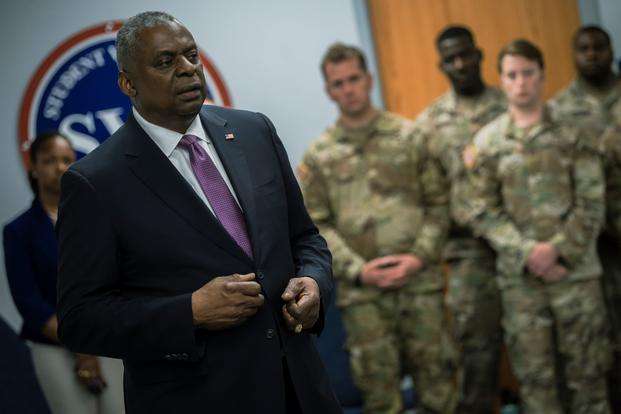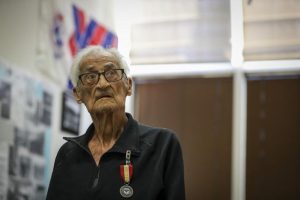FAYETTEVILLE, North Carolina — Defense Secretary Lloyd Austin stood before the graduating students of Fayetteville State University on Saturday, the first Black person to lead the Pentagon speaking to the latest class at a historically Black college.
Among the graduates to hear Austin’s commencement address were 17 about to become newly minted second lieutenants from the North Carolina university’s ROTC program. The day before, Austin visited with soldiers at nearby Fort Bragg, which in June will strip its Confederate name and wipe away a shadow of its racist past when it becomes Fort Liberty.
Austin’s message was about service and diversity, and it was personal.
“I grew up in Georgia in the time of Jim Crow. Our local public high school had long been all white,” Austin said in his speech. “And one of my sisters and I were among the first Black students to integrate it.
“Those were pretty ugly days,” he said. “And the first year was especially tough.”
Military service “deepens our democracy,” he told the graduates. But other public service is crucial, Austin said, such as the teachers, school leaders and public officials who stood up for him as a child when the U.S. was still “painfully segregated” — years after the Supreme Court had struck down the “separate but equal” doctrine.
“I still remember their quiet resolve and civic spirit, and they taught me that service means standing firm on the American principle that all people are created equal,” he said.
Austin, now retired from service, is a West Point graduate with a stellar 41-year career in the military that included heading U.S. Central Command. He was also tapped by President Joe Biden’s administration, which has focused on making the federal government — and the Pentagon — more diverse, to run the Pentagon.
This year marks the 75th anniversary of President Harry Truman integrating the military, a decision in 1948 that finally gave Black troops and others from racial minorities equal treatment.
Few have the authority, resume and position to deliver that message like Austin. FSU students are 80% from racial minorities, and 70% female.
And Austin’s visit comes at a time when the services are struggling to meet recruiting goals and looking to attract a young, more diverse generation to enlist. For decades, the military has been a true melting pot, but the services are more than ever seeking inclusion as a selling point.
On Friday, the defense secretary met with 16 Army and 19 Air Force ROTC cadets at the university.
“We’ve got some great future airmen here, probably some Space Force Guardians in the crowd,” Austin told the group during a meeting on campus. “Some future soldiers in the crowd as well. That’s all pretty exciting.”
The Army said earlier this month that it will not hit its recruiting goal of 65,000 active-duty troops for the year, after falling short 15,000 soldiers last year. The Air Force said in March it will likely miss its annual recruiting goals by 10%.
But the efforts by Austin and others to foster diversity in the ranks have also sparked controversy and blowback from Republicans, who have lumped the issue together with other policy objectives such as rooting out extremism and easing climate change as “woke.”
It is part of a “pernicious ideology” that hurts the military’s ability to fight wars, the Heritage Foundation, a conservative think tank in Washington, D.C., said in a recently released report.
Still, Austin’s appearance and speech at FSU served as a sign of changing times as much as the military’s hopes of expanding its recruitment pool.
Fort Bragg, where the defense secretary met 82nd Airborne Division special operators that he once commanded, is about to be no more — at least in name.
In early June, it will become the latest Army installation to be renamed through an act of Congress that will remove references to Confederates who fought for southern slavery during the Civil War. Fort Bragg’s namesake, Gen. Braxton Bragg, was a slave owner and military leader with a minimal record of success. The base was originally named Camp Bragg in 1918.
The renaming turns the page on an earlier era where pockets of the U.S. sought to glorify the South’s secession.
Austin never mentioned the change, but it still seemed to hang over his trip to Fort Bragg and FSU, and his speech about diversity and past American racism. Earlier this week, the Army renamed Fort Hood to Fort Cavazos to honor a Hispanic war hero, and it renamed Fort Benning after Hal Moore, the legendary Vietnam commander, and Julia Moore, his wife and an advocate for military families.
“I know that the road forward may seem steep. I know that many of you see the distance between where America is and what America should be, and what America can be,” Austin told the university graduates. “But to make America’s promise real, our democracy needs you.”
— Travis Tritten can be reached at travis.tritten@military.com. Follow him on Twitter @Travis_Tritten.
Please rate this CIBA article
Vote






